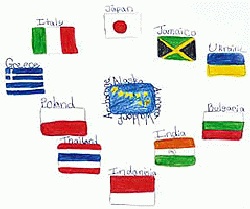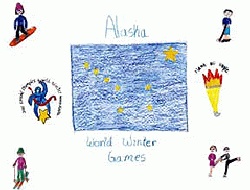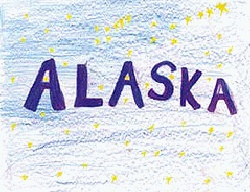He caught my attention the first second he walked into the room. Appearing at first a boy of no more than 12, with close-cropped hair and a loose dark shirt, he sat down in front of the network terminal beside me and logged in. My first surprise came when I noticed he was an athlete, a fact given by his badge. The second surprise came when he opened the Internet browser and logged into his Hotmail account. As he scanned his In box, all the while mumbling about how many sales pitches he got every day, what intrigued me the most was how independent he was. He seemed to be the eye-of-the-storm in a hurricane of reporters, some of whom did not know what Hotmail even was.
 |
| 'Flags' by Jordan Randolph, 4th grade |
 |
The Special Olympics World Winter Games happened to be the largest and most globally impacting sporting event ever to be held in Alaska. It was an event of eager anticipation, stunning turnout, and inspiring performances. The media, thousands of spectators, and even Hollywood celebrities showed up to join the fray and cheer on the athletes at every event. Reporters and journalists from around the world came to observe the events and send their images and stories home to a local newspaper. TV crews broadcast the events live. The Special Olympics was, to describe it lightly, thrilling.
When I worked in the Special Olympics media center at the Hilton, I had more than a fair share of dilemmas, impatient reporters, and insane computers. Sometimes when I had nothing to do, I would slump into a chair and stare blankly at a screen for hours on end. Then there were times when I had three or more problems to fix, phones ringing, the copier jamming, printing woes…ad infinitum. Every now and then I managed to catch an interesting snippet of conversation, a funny scene, a memorable moment.
One of the greatest challenges I faced turned out to be the language barrier. It wasn’t unusual for a foreign reporter to walk into the room with little or no experience in English. Sometimes when they had a problem they would walk off in search of an interpreter. Other times, they would try to solve their problems by themselves. There were rare occasions, as well, when a foreign reporter would attempt to communicate without English.
One time a Venezuelan reporter walked up to me speaking Spanish. She had a nearly nonexistent English vocabulary and it was necessary for me to fill in her pauses with educated guesses. I went to search for an interpreter right away. With an interpreter, it became clear that she needed digital images from her camera’s flash card loaded onto her computer and proofread. Then she needed me to attach them to an email message, as well as copy them onto disk and clear the flash cards. After a while, she left to go back to her hotel for something, leaving me with her assistant, who knew no English at all. The interpreter’s shift ended, unluckily for me, right at this moment.
 |
| 'Alaska World Winter Games' by Brittney Moore, 6th grade |
 |
The next hour was interesting, to say the least. I had finished emailing the images away, and consulted with him on how to put the images on disk: all in sign language of course. I decided the best ways would be either to put them onto a floppy disk or burn them on CD. We tried the latter first. I signaled to him with my hands that I could "grab the stuff in the flash card and drop them onto a spinning plate." I guess I was lucky he understood this. He then left to his room to get a CD.
In the meantime, a man from Switzerland brought his laptop into the room in order to connect to the net to email a file. Luckily for me, he could speak English. The only problem was that his laptop refused to connect and he had no floppy drive attached to his computer. So I set about updating his connection settings, all the while trying to avoid doing something disastrous. Everything on the laptop was in German, naturally. He had a pretty hard time translating it as well. When I wanted to restart, I chose "neustart" and hoped it wouldn’t delete his files and start anew. It was like being asked to rendezvous with a vacant Russian space station to fix their life support computer system with a pair of pliers while dressed in a fully sealed space suit.
At about this time, the Venezuelan came back with two CDs. I took a look at them and let out a groan. He brought two un-writable CDs. I gave up trying to put his images on a CD and decided to put them on floppy disks instead. It turned out that the pictures, edited and reduced, took up 25 disks and two hours to complete. The next day when I arrived at the media center I brought two recordable CDs in order to prevent having to feed the computer another 25 disks.
One of their fellow reporters came in and asked for me to put their pictures on CD again. There was no interpreter this time and someone was using the computer with the CD burner. In an attempt to communicate to me, the reporter put one palm on top of the other and made the top palm take off from the bottom one. He pointed to the clock and held up a finger. Surely he couldn’t mean that his flight was taking off in an hour! Trying to validate what I thought he tried to say to me, I lifted my hand and made it fly around a bit, then I held out a finger and pointed at the clock. He nodded glumly.
My eyes opened wide. I rushed to the computer and "politely" budged the person sitting there aside. I shoved the CD into the drive, plugged in the flash card, and worked frantically. Within half an hour, the CD was recorded, his flash cards were set, and he hurried out of the room with them. I wiped some sweat from my forehead, collapsed into the nearest chair, then apologized to the previous user of the computer as she went back to work. That same man came back into the room the very next day and greeted me with some foreign phrase. My eyes popped. He hadn’t left at all!
 |
| 'Alaska' by Jordan Randolph, 4th Grade |
 |
Another time, a woman entered the media center and walked up to me. Seeing her inquisitive face, I put down my newspaper.
"Hi," I said.
"Hello," she replied. "Do you know where I can find the Tech Leader here?"
"It’s me," I said. Noting the skeptical look on her face, I asked "what do you need help with?"
Seeming to come out of a trance, she blinked and said that she needed help printing her document. I followed her over to her machine and peered at her printer status window.
"Seems like the printer has a problem printing the document, " I said as I attempted to delete it from the printer’s cue list. "Your document is stuck in the cue list. It doesn’t seem to want to come out."
The lady stared at me thoughtfully. "So fix it."
After fiddling with the computer some more and resetting the printer, I came back to the lady and shook my head. Her eyes bored through mine with an icy stare. I recalled that most of the hardware in the media room was linked up to the tech headquarters in the Egan Center and that they had the access privileges to force the printer to reject the document. "I could call the tech manager at the Egan," I told her.
"So do it. Call him. I have to have two copies of this paper in half an hour."
By this time, more than one person had tried to use the printer. They sent their documents, all of which got stuck in the traffic jam that was rapidly starting to pile up behind the lady’s document.
"Why doesn’t it print?"
"What’s going on? The printer stopped responding."
"How long will it take to fix?"
I decided to call the Egan as fast as I could. Within 30 minutes, they had the stuck document deleted.
In a few minutes the lady came up to me again asking me what happened to her computer. It had frozen and she had not saved her file. I tried to tell her there was nothing I could do about it, though I felt like I was going to sink into the floor. I restarted the machine, it booted up, and her document was nowhere to be seen. Half an hour later, after I had given up on her document, I did a routine login on a different computer. Her document suddenly popped up in the screen to my great surprise. I printed it without error, gave it back to her, and everyone lived happily ever after.
Before spring break, I was assigned to write an essay on facing challenges. That put me into a quandary. How could volunteering as a computer tech have any challenges worth writing about? On the other hand, it was too late for me to change my volunteering job. Now when I think back to the events that happened during the Special Olympics, though, I saw that volunteering without direct contact to the sports events was an uplifting experience nonetheless. I realized that everyone had challenges they had to face, even if they were not physical challenges. I also realized that I was there to "coach" and help them overcome those challenges, just as people reached out hands to help mentally disabled athletes overcome their challenges. That was what the Special Olympics was all about.




